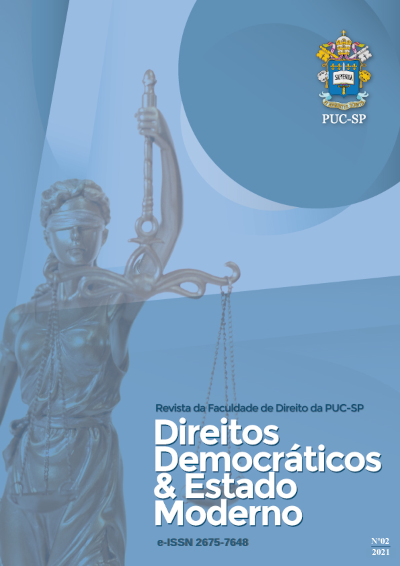The limits of the conciliator's action in the civil process: a critical analysis from the Modern Democratic State perspective
DOI:
https://doi.org/10.23925/ddem.v0i2.50449Keywords:
procedural conciliation, limits of the conciliator, consensual solution, constitutional principle of access to Jurisdiction, reasonable length of process, fraternityAbstract
The objective of this article is to describe and analyze in a critical-scientific way the limits of the conciliator's performance in the modern civil process in the light of the 2015 CPC, which prioritizes in a preponderant way the consensual solution of the conflicts, in the mold of art. 3, paragraph 3 of said diploma. In order to do so, it will address the history, principles and advantages of the consensual composition of litigation, demonstrating the relevance of the role of the conciliator in this sense, in the light of the consolidation of a democratic state where rights of the citizens are more quickly fulfilled, while being subject to material and procedural normative limits. In this purpose, will be adopted the scientific inductive methods, as well as the dialectical.
References
BANDEIRA, Regina. Relatório Justiça em números traz índice de conciliação. Disponível em: <http://www.cnj.jus.br/noticias/cnj/83676-relatorio-justica-em-numeros-traz-indice-de-conciliacao-pela-1-vez> Acesso em: 05 jan. 2018.
BARZOTTO, Luciane Cardoso. Acesso à Justiça e fraternidade: o exemplo da conciliação. In BARZOTTO, et alii. (org) Direito e Fraternidade: em busca de respostas. Porto Alegre: Sapiens, 2016.
BRASIL. Código de Processo Civil - LEI Nº 13.105, DE 16 DE MARÇO DE 2015, Brasília, DF, mar 2017. Disponível em: <http://www.planalto.gov.br/ccivil_03/_Ato2015-2018/2015/Lei/L13105.htm>. Acesso em: 05 jan. 2018.
BRASIL. LEI Nº 9.099, DE 26 DE SETEMBRO DE 1995, Brasília, DF, nov 2018. Disponível em: < http://www.planalto.gov.br/ccivil_03/LEIS/L9099.htm>. Acesso em: 05 jan. 2018
BRASÍLIA, DF: SENADO FEDERAL: CENTRO GRÁFICO, 1988. 292 P. BRASIL. CONSTITUIÇÃO (1988). CONSTITUIÇÃO DA REPÚBLICA FEDERATIVA DO BRASIL.
DIDIER Jr., Fredie. A distribuição legal, jurisdicional e convencional do ônus da prova no novo Código de Processo Civil brasileiro. Revista Direito Mackenzie, v. 11, p. 129-155, 2017.
DIDIER Jr., Fredie. Negócios jurídicos processuais atípicos no Código de Processo Civil de 2015. Revista Brasileira da Advocacia, v. 1, p. 59-86, 2016.
DIDIER Jr., Fredie. Novo CPC: doutrina selecionada. Parte Geral. V1. Salvador: Juspodivm, 2016, pp. 373-375.
FINCATO, Denise Pires. A pesquisa jurídica sem mistérios: do projeto de pesquisa à banca. Porto Alegre: Notadez, 2008, p.39.
FONSECA, Reynaldo Soares da. Verbete 58. Fraternidade e Direitos Fundamentais: Constitucionalismo Fraternal. In Direito do Trabalho, Tecnologia, Fraternidade e OIT - BARZOTTO, Luciane Cardoso et alii. São Paulo: Revista dos Tribunais, 2020.
JÚNIOR, Humberto Theodoro. Curso de Direito Processual Civil – Teoria geral do direito processual civil, processo de conhecimento e procedimento comum – vol. 1. 56. ed. rev., atual. e ampl. – Rio de Janeiro: Forense, 2015
LUDWIG, Frederico Antônio Azevedo. A evolução histórica da busca por alternativas eficazes de resolução de litígios no Brasil. In: Âmbito Jurídico, Rio Grande, XV, n. 107, dez 2012. Disponível em: <http://www.ambito-juridico.com.br/site/?n_link=revista_artigos_leitura&artigo_id=12354>. Acesso em jan 2019.
MANCUSO, Rodolfo de Camargo. A Resolução dos Conflitos e a Função Judicial. São
Paulo: Ed. Revista dos Tribunais, 2009, pp. 223/224.
OLIVEIRA, Geisa Cadilhe de. Técnicas de solução de conflitos: autocomposição e heterocomposição. Conteúdo Jurídico, Brasília DF: 19 dez. 2013. Disponível em: <http://www.conteudojuridico.com.br/?artigos&ver=2.46327&seo=1>. Acesso em: 04 jan. 2019.
RIVAS, Pablo Ramirez. Fraternidad y conflito. (comp). Buenos Aires: Editorial Ciudad Nueva, 2011.
TARTUCE, Fernanda. Mediação nos Conflitos Civis, São Paulo: Método, 2008, p. 296.
Downloads
Published
How to Cite
Issue
Section
License
Copyright (c) 2021 Democratic Rights & Modern State

This work is licensed under a Creative Commons Attribution 4.0 International License.
This work is licensed under a License Creative Commons Atribuição 4.0 Internacional.
The authors grant the journal all copyrights relating to the published works. The concepts issued in signed articles are the absolute and exclusive responsibility of their authors.
DD&EM Magazine - ISSN 2675-7648

















